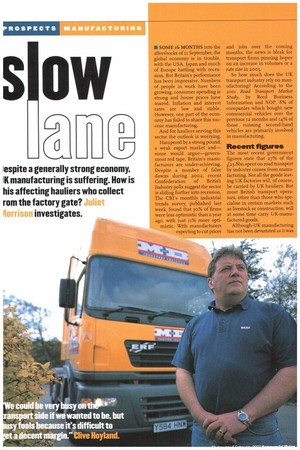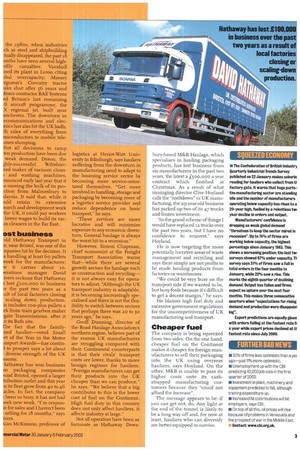ow
Page 36

Page 37

If you've noticed an error in this article please click here to report it so we can fix it.
Iespite a generally strong economy, IK manufacturing is suffering. How is his affecting hauliers who collect rom the factory gate? liet
1401 avUi4 investigates. • SOME 16 MONTHS into the aftershocks of II September, the global economy is in trouble, with the USA. Japan and much of Europe battling with recession. But Britain's performance has been impressive. Numbers of people in work have been growing, consumer spending is strong and house prices have soared. Inflation and interest rates are low and stable. However, one part of the economy has failed to share this success: manufacturing.
And for hauliers serving this sector the outlook is worrying.
Hampered by a strong pound, a weak export market and— some would arguegovernment red tape, Britain's manufacturers are under-achieving. Despite a number of false dawns during 2002, recent Confederation of British Industry polls suggest the sector is sliding further into recession. The CBI's monthly industrial trends survey, published last week, found that 30% of firms were less optimistic than a year iogo, with just n% more opti
mistic. With manufacturers
expecting to cut prices and jobs over the coming months, the news is bleak for transport firms pinning hopes on an increase in volumes or a rate rise in 2003.
So how much does the UK transport industry rely on manufacturing? According to the 2001 Road Transport Market Study, by Reed Business Information and NOP, 8% of companies which bought new commercial vehicles over the previous 12 months and 14% of those running second-hand vehicles are primarily involved in manufacturing.
Recent figures
The most recent government figures state that 27% of the L23.8bn spent on road transport by industry comes from manufacturing. Not all the goods leaving UK factories will, of course, be carried by UK hauliers. But most British transport operators, other than those who specialise in certain markets such as livestock or construction, will at some time carry UK-manufactured goods.
Although UK manufacturing has not been devastated as it was the 19805, when industries :ch as steel and shipbuilding tually disappeared, the past 18 onths have seen several highofile casualties: Vauxhall )sed its plant in Luton citing abal overcapacity; Massey rguson's Coventry tractor nics shut after 56 years and fence contractor BAE Systems ed Britain's last remaining ill aircraft programme, the X regional jet, built near a nchester The downturn in ecommunications and elecmics has also hit the UK badly, th sales of everything from miconductors to mobile teleones slumping.
Not all decisions to ramp wn production have been due weak demand. Dyson, the ghly-successful Wiltshiresed maker of vacuum clean; and washing machines, flounced early last year that it Is moving the bulk of its proction from Malrnesbury to alaysia. It said that, while it )uld retain its extensive ;earch and development work the UK, it could pay workers • lower wages to build its vacin cleaners in the Far East.
ost business
,vid Hathaway Transport in te, near Bristol, was one of the mpanies hit by the decision. It s handling at least Go pallets week for the manufacturer; w it carries about so. wrations manager David .ivers reckons that Hathaway s lost boo,000 in business the past two years as a :ult of local factories closing scaling down production. is includes roo-plus pallets a ek from train gearbox maker 'gate Transmissions, after it it its Bath site.
['he fact that the familyned haulier—voted Small 'et of the Year in the Motor Insport Awards—has contini to prosper says a lot about diverse strength of the UK inomy.
-lathaway has won business m packaging companies iund Bristol, opened a larger tribution outlet and this year
n its fleet grow from 40 to 46 tides. In fact, the company ; been so busy, it has not had ;eek new work. "I'm responle for sales and I haven't been selling for 18 months," says ivers.
silan McKinnon, professor of
logistics at Heriot-Watt University in Edinburgh, says hauliers suffering from the downturn in manufacturing need to adapt to the booming service sector by becoming more service-orientated themselves. "Get more involved in handling, storage and packaging by becoming more of a logistics service provider and reduce dependence on basic transport," he says.
"These services are more lucrative and will minimise exposure to any economic downturn. General haulage is always the worst hit in a recession."
However, Simon Chapman, chief economist at the Freight Transport Association warns that—while there are several growth sectors for haulage such as construction and recycling— it is not always easy for operators to adjust. "Although the UK transport industry is adaptable, it is becoming increasingly specialised and there is not the flexibility to switch between sectors that perhaps there was 20 to 30 years ago," he says.
Geoff Dunning, director of the Road Haulage Association's northern region, believes part of the reason UK manufacturers are struggling compared with their Continental counterparts is that their rivals' transport costs are lower, thanks to more benign regimes for hauliers, "Foreign manufacturers can get their products into the UK cheaper than we can produce," he says. "We believe that a big contributor to this is the lower cost of fuel on the Continent. High fuel duty in this country does not only affect hauliers, it affects industry at large."
Not all operators have been as fortunate as Hathaway. Dews
bury-based M&B Haulage, which specialises in hauling packaging products, has lost business from six manufacturers in the past two years, the latest a koo,000 a year contract which finished at Christmas. As a result of what managing director dive Hoyland calls the "meltdown" in UK manufacturing, the 29-year-old business has parked up two of its 47 trucks and frozen investment.
-In the grand scheme of things I would have replaced 12 trucks over the past two years, but I have no confidence to reinvest," says Hoyland.
He is now targeting the more potentially lucrative areas of waste management and recycling and says there simply are not profits to be made hauling products from factories or warehouses.
"We could be very busy on the transport side if we wanted to be, but busy fools because it's difficult to get a decent margin," he says.
He blames high fuel duty and excessive government regulations for the uncompetitiveness of UK manufacturing and transport.
Cheaper fuel
The company is being squeezed from two sides. On the one hand, cheaper fuel on the Continent makes it cheaper for foreign manufacturers to sell their packaging into the UK using overseas hauliers, says Hoyland. On the other, MELB is unable to pass its higher costs onto its cashstrapped manufacturing customers because they "could not afford the increase".
The message appears to be: if you can get out, do. Any light at the end of the tunnel is likely to be a long way off and, for now at least, hauliers who can diversify are better-equipped to survive.




























































































































































